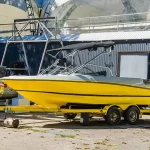
Marine Surveyor 32223 – Are there Different Survey Requirements for Freshwater and Saltwater Vessels?
When considering purchasing a boat, one of the most important things to do is hire a Marine Surveyor 32223. This is because they are able to assess the condition of a vessel to determine what repairs or upgrades may be needed before you embark on your journey. But when it comes to survey requirements, is there a difference between freshwater and saltwater vessels? With Suncoast Marine Surveying, we can help you understand what each vessel needs to ensure that your experience is safe and enjoyable.
First, it’s important to understand the differences between freshwater and saltwater vessels. Freshwater vessels are boats used in rivers, lakes, swamps, bays and other bodies of fresh water. The main consideration for freshwater vessels are their materials as they often aren’t exposed to the same level of wear-and-tear as saltwater vessels. For example, the metal parts on a freshwater boat won’t deteriorate as quickly as those on a saltwater vessel due to corrosion from saltwater exposure. Additionally, a freshwater boat will typically cost less than its saltwater counterpart due to the differences in construction materials.
The primary difference between a marine survey conducted for a freshwater versus a saltwater vessel is who performs the visual inspection. A Marine Surveyor 32223 typically inspects both types of vessels but they have different qualifications depending on the type of boat being surveyed. For freshwater vessels, a marine surveyor with general boating knowledge can conduct the survey. However, for saltwater vessels, a more experienced marine surveyor is needed due to the greater complexity of these larger vessels.
Another way that surveys of freshwater and saltwater vessels differ is in the amount of time spent on board. Generally, a marine surveyor conducting an inspection of a freshwater vessel will spend around 90 minutes to two hours onboard surveying various parts and systems of the boat. On the other hand, inspections for saltwater vessels usually require several hours due to their more complex design. In many cases, it can take up to five hours or more to complete a detailed survey of a larger saltwater vessel.
Finally, there are certain areas that should be considered more closely on saltwater vessels than on freshwater vessels. For saltwater vessels, a marine surveyor will check the engine and steering systems for signs of damage caused by seawater intrusion. Additionally, careful attention must be paid to the electrical wiring and fuel system components to ensure that they are properly insulated and protected from corrosion due to exposure to salt water.
At Suncoast Marine Surveying, we understand that each type of vessel has different survey requirements. Our team of experienced Marine Surveyor 32223 have the knowledge and expertise necessary to accurately assess both freshwater and saltwater vessels so that our clients make informed decisions about their purchases. From accurate reports on repair costs to advice on sea worthiness and safety, we are dedicated to providing our clients with the best possible service. Contact us today to learn more about our services and how we can help you get out on the water safely.r



